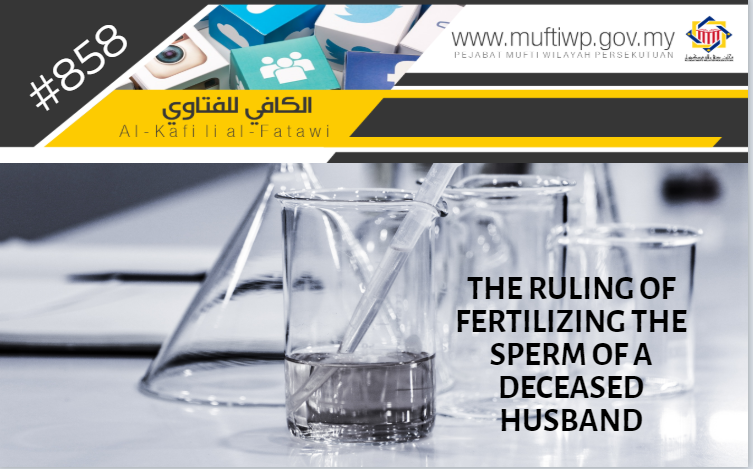Question:
Assalamualaikum wbt,
There are people asking questions regarding a medical intervention to help couples conceive a baby. A husband and wife stored 7 test tubes of sperm for in vitro fertilization. However, the husband suddenly passed away. Is it permissible to fertilize the sperm with the ovum of the wife after the absence of the husband?
Answer:
Waalaikumussalam wrm. wbt,
Alhamdulillah, praise and thanks to Allah for the countless blessings He has blessed us all with. Blessings and salutations to the Prophet Muhammad PBUH, his wives, his family, companions and all those that follow his teachings to the day of judgement.
It is prohibited for a widow to use the stored semen of her late husband with the purpose of conceiving a baby. The reason is, once the husband passes away, their relationship as husband and wife ended. Hence, the semen from a man stored before his death is prohibited to be used by his wife for the purpose of fertilization and conceiving.
5th Muzakarah of Fatwa Committee of National Council for Malaysia Islamic Religious Affairs Meeting convened on 16th -17th November 1982 and the 6th Muzakarah of the Fatwa Committee of National Council convened on 10th October 1983 discussed the Test Tube Babies. Muzakarah has decided that:
- Test tube baby from the semen of the husband and wife which then is fertilized ‘respectably’ is valid in Islam. Consequently, if the semen and ovum is taken from someone else other than a husband and wife is invalid.
- It is permissible for babies born through the help of medical intervention to be a wali and has a right to accept inheritance from their family members.
- If the semen and ovum from a husband and wife is obtained through means that does not contradict with teachings of Islam, then it is considered as a ‘respectable’ means.
Among the prohibited test tube baby is the usage of the husband’s semen which is stored in a Sperm Bank after the death of the husband by his wife for the purpose of conceiving. Syeikh Prof Dr Ali al-Qurahdaghi in his book Fiqh al-Qadhaya al-Fiqhiyyah al-Mu`asirah (pg. 574) said:
“The process of fertilization when the husband is still alive is still possible even after his death. A pregnancy from the fertilization of nutfah (semen from a man) collected before the husband’s death and stored in a place known as Sperm Bank. This type of fertilization is prohibited through qat’I, whether it is performed through in-vitro or in-vivo. The reason is, the marriage relationship ended when the husband died, then the nutfah become prohibited for the widow. If a baby is born from the semen, then the child is prohibited to be named after the source of the semen because the source was dead even before it is fertilized.”
According to the above discussion, we agree with the opinion stating that stored semen of a deceased husband is prohibited to be fertilized and should be destroyed, in accordance with the ruling decided by 1st National Muzakarah of Fatwa Committee of National Council for Malaysia Islamic Religious Affairs held on 28th -29th January 1981, which states; if there is a sperm bank storing semen of a deceased, then the government should take action and destroy it.
Wallahua’lam.


